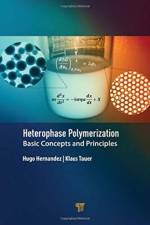- Basic Concepts and Principles
av Hugo Hernandez & Klaus Tauer
1 947
Heterophase polymerization is a century-old technology with a wide range of relevant industrial applications, including coatings, adhesives, rubbers, and many other specialized biomedical and high-performance materials. However, due to its multiscale complexity, it still remains a challenging research topic. It is a broad field covering all heterogeneous polymerization processes that result in polymer dispersions. Its technical realizations comprise emulsion polymerization, dispersion polymerization, suspension polymerization, miniemulsion polymerization, microemulsion polymerization, and others. This book is devoted to the science and technology of heterophase polymerization, considering it a generic term as well as an umbrella expression for all of its technical realizations. It presents, from a modern perspective, the basic concepts and principles required to understand the kinetics and thermodynamics of heterophase polymerization at the atomistic, molecular, macromolecular, supramolecular, colloidal, microscopic, mesoscopic, and macroscopic scales. It critically discusses the important physicochemical mechanisms involved in heterophase polymerization, such as nucleation, particle aggregation, mass transfer, swelling, spontaneous emulsification, and polymerization kinetics, along with the experimental evidences at hand.

